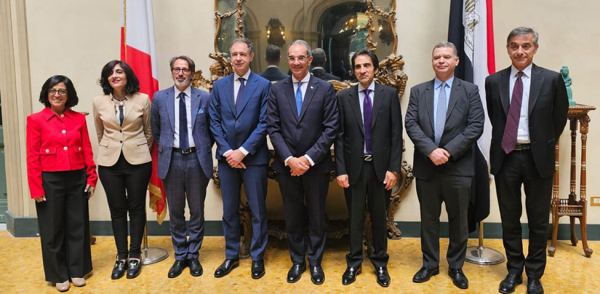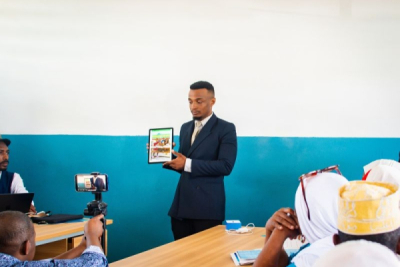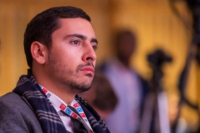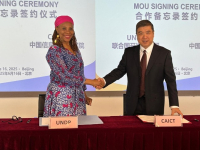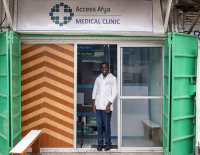Before launching his own ventures, he built his career helping companies design and implement data and AI platforms, working with firms specialized in big data and data science. He also serves on the boards of several companies.
Soulaimane Lahrech (pictured) is a Moroccan entrepreneur who specializes in artificial intelligence and data management. He is the CEO of Talaty, a fintech company that builds digital tools to help small and medium-sized enterprises (SMEs) secure financing across Morocco and Francophone Africa.
Founded in 2022, Talaty has created an instant credit platform powered by advanced AI technologies, including computer vision, text analysis, and behavioral finance tools. This system helps financial institutions speed up loan approvals, lower operating costs, and reduce default risks, all while opening up credit access to businesses traditionally excluded from the banking system.
What sets Talaty apart is how easily its platform connects to the existing systems used by banks and other financial providers. Thanks to AI, the platform delivers faster, fairer risk assessments, helping entrepreneurs access financing with fewer hurdles. The broader goal is to boost local economic growth by making funding more accessible for businesses.
In addition to his work at Talaty, Lahrech is a founding partner and operations director at AIOX Labs, a company focused on building businesses across Africa and Europe. He is also a partner at 34 Ventures, an investment firm, and sits on the boards of several AI and data companies, including Deepecho, ToumAI, and Akumen IA.
Lahrech graduated from ESSEC Business School in France in 2013 with a master’s degree in management and business administration. In 2015, he earned a degree in tech entrepreneurship and computer science from the University of California in the United States.
His professional journey started in 2011 with ESSEC Conseil International. By 2012, he was working as a data and digital strategy consultant at Capgemini Invent, the innovation and transformation arm of Capgemini Group. Between 2017 and 2018, he served as a project lead at Equancy, a French consulting firm specializing in digital strategy and data management.
Melchior Koba
These engagements mark a significant step in Egypt’s efforts to position itself as a regional leader in digital services, deepen international cooperation, and create new job opportunities for its youth in the global tech economy.
Egypt’s Minister of Communications and Information Technology, Dr. Amr Talaat, met with top Italian industry leaders and business representatives in Rome to deepen cooperation in the ICT sector and promote Egypt as a global offshoring hub, the Ministry of Communications and Information Technology announced June 19. The meetings were part of a broader push to attract foreign investment and expand bilateral partnerships in digital transformation and innovation.
Dr. Talaat met with Enrico Bagnasco, CEO of Sparkle and President of Confindustria Assafrica & Mediterraneo, alongside Egypt’s Ambassador to Italy, Bassam Rady. Discussions focused on fostering partnerships between Egyptian and Italian ICT companies, with a spotlight on expanding cooperation in digital capacity building through linkages between Sparkle Academies and Egypt’s WE Applied Technology Schools.
The Minister also reviewed the achievements of the ongoing partnership between Telecom Egypt and Sparkle, particularly in enhancing international digital infrastructure. He outlined Egypt’s Digital Egypt Strategy for the Offshoring Industry, emphasizing the country’s strategic advantages, including a skilled multilingual workforce, advanced infrastructure, and competitive incentive packages for investors.
In a separate meeting, Dr. Talaat met with Alfonso Siano, Head of International Relations at Intesa Sanpaolo, Italy’s leading banking group. Discussions centered on expanding the bank’s operations in Egypt and exploring collaborations in FinTech innovation. The Minister highlighted Egypt’s fast-growing offshoring sector, particularly in banking and financial services, and its ability to support global operations with digitally skilled youth and cutting-edge digital infrastructure.
Further discussions were held with Gianfranco Previtera, President of AlmavivA, one of Italy’s largest tech companies, and Amr Sayed, Business Development Manager for MENA. AlmavivA shared plans to scale its Egypt office and grow its workforce to meet rising demand for offshoring services, leveraging Egypt’s talent pool and cost-effective business environment.
This push to deepen Egypt–Italy digital cooperation directly supports Egypt’s broader ambitions to become a global hub for IT offshoring, digital services, and innovation-driven investment. Egypt’s Digital Egypt Strategy for the Offshoring Industry, launched by the Ministry of Communications and Information Technology (MCIT), aims to attract $9 billion in digital exports annually by 2026.
Hikmatu Bilali
Highlights:
- Liquify converts unpaid invoices into near-instant working capital for SMEs
- The Ghanaian fintech offers funding in 24 to 48 hours via an online platform
- The startup plans to expand across Africa with new financial partnerships
Liquify, a fintech solution developed by a young Ghanaian startup, is making it easier for small and medium-sized businesses to unlock cash from unpaid invoices.
The company was founded in 2023 by Nadya Yaremenko and Alberta Asafo-Asamoah. Its platform lets businesses convert outstanding customer invoices into quick cash, helping improve cash flow without waiting weeks for payments.
“We unlock cash trapped in their unpaid invoices: exporters upload an invoice, our platform runs KYC/AML and credit checks, and the invoices get funded within hours, not weeks, at a fraction of the cost,” explained co-founder Nadya Yaremenko.
Liquify uses its own technology to analyze risk and verify cross-border payments, making the process fast and secure. There is no mobile app involved. Businesses submit invoices through the online platform and can receive funding within 24 to 48 hours.
The startup has already supported several hundred SMEs in Ghana and Kenya and has big plans to expand across Africa. To grow its model, Liquify is looking to build partnerships with banks and export promotion agencies.
In the medium term, the company aims to add foreign exchange hedging and credit scoring tools to its platform. The goal is to create a one-stop shop for B2B financing in African markets.
“We give global investors access to a new untapped asset class. Each invoice is a short-term, self-liquidating note showing almost zero correlation with public markets. We do it end-to-end and paper-free. From onboarding to settlement, everything happens on our digital platform, no couriers, no spreadsheets, no guesswork,” added Yaremenko.
Adoni Conrad Quenum
Key highlights:
- The DRC will roll out SISAG, a real-time digital monitoring platform for government projects, in Q3 2025.
- The system will centralize data, track delays, and connect ministries for improved coordination and transparency.
- Inspired by African peers like Rwanda and Benin, the platform is a core part of the country’s 2024–2028 Government Action Program.
The Democratic Republic of Congo (DRC) plans to launch a new digital platform called SISAG in the third quarter of 2025 to improve monitoring and transparency of government projects.
SISAG, an Information System for Monitoring Government Actions, will centralize data on priority projects and update progress in real time. The system will feature dashboards for live tracking, automatic alerts for delays, and data sharing across ministries.
The platform will connect with key institutions including the National Institute of Statistics, the National Secretariat for Capacity Building, and the Agency for Digital Development to ensure reliable data flow.
A dedicated technical unit, USAG, will coordinate ministries, compile data, and provide objective analysis to support decision-making and accountability.
A Core Part of the 2024–2028 Government Action Program
SISAG fits into the Government Action Program (PAG) for 2024–2028, recently adopted by Congo’s leaders. The PAG demands clear indicators, measurable goals, and results-driven public action.
SISAG aligns political goals with technology. It tracks commitments closely and enables ongoing evaluation. The system will speed up public investments, enhance coordination between ministries, and increase transparency in managing resources.
Learning from Africa’s Best Practices
DRC models SISAG on successful tools used in other African countries. Rwanda uses Imihigo, a performance system based on annual contracts. Benin relies on MPAT to assess ministry performance. These tools have proven they can boost accountability and energize government action.
Once fully up and running, DRC plans to expand SISAG to provincial governments. This will allow detailed monitoring of local projects. Eventually, DRC may open parts of SISAG’s data to the public to build citizen trust. But this will require firm political backing, careful rollout, and strong buy-in from all stakeholders.
This article was initially published in French by Samira Njoya
Edited in English by Ange Jason Quenum
- Comoros unveils two digital platforms, E-Shiyo and E-Msomo, to expand education access and improve school governance.
- E-Shiyo offers online textbooks; E-Msomo tracks student data and automates academic reports.
- The initiative is part of the “Comoros Digital 2028” plan, with UNICEF backing and support from ANADEN.
Comoros takes a big step toward modern education by launching two digital platforms, E-Shiyo and E-Msomo. These tools aim to fix problems of access, fairness, and outdated systems in schools.
The Ministry of National Education leads this effort, with technical help from the National Agency for Digital Development (ANADEN) and funding from UNICEF. Their goal: improve education access and tighten governance.
E-Shiyo offers an online library of textbooks for pre-primary and primary students. Kids can access lessons anytime, anywhere, on any connected device.
E-Msomo digitizes school administration. It creates a centralized system for managing report cards, assigns each student a unique ID, and tracks academic results automatically. This system helps schools trace student progress, boost transparency, and support better decisions by education officials.
This push fits into the “Comoros Digital 2028” plan, which aims to grow the digital sector’s share of GDP to 5% by 2028. Across Africa, e-learning is booming. Ambient Insight projects the continent’s online learning market will top $1.5 billion by 2030.
Beyond just handing out digital books and report cards, these platforms improve governance. They consolidate data to measure school performance, cut errors, and allocate resources smarter.
Next steps include boosting internet access—currently only 35.7% of Comorians are online—equipping schools with digital gear, training teachers, and protecting student data.
This article was initially published in French by Samira Njoya
Edited in English by Ange Jason Quenum
Starlink, SpaceX’s satellite internet service, is now available in Guinea-Bissau, delivering high-speed, low-latency connectivity to the country, it announced June 18.
This rollout marks Starlink’s entry into its 20th African market. The improved connectivity is expected to benefit key sectors like education, healthcare, agriculture, and enable more remote work and digital services.
While costs may still limit widespread adoption, Starlink’s arrival represents a major step toward closing Guinea-Bissau’s digital divide and expanding internet access across the country.
Key Highlights:
- Belaroui Belkacem, a trained bioinformatician, founded K-ZONE, an e-commerce platform endorsed by Algeria’s Ministry of Knowledge Economy.
- Launched in 2020, K-ZONE offers both international brands and locally made products to Algerian consumers at home and abroad.
- Belkacem also leads a life sciences club at Oran 1 University and has held roles at Sonatrach and the Mediterranean Games Committee.
Belaroui Belkacem, a bioinformatician from Algeria, has pivoted from science to entrepreneurship, launching an e-commerce venture that connects Algerians with both local and global products.
Belkacem founded K-ZONE in 2020, a digital marketplace that sells items tailored for everyday use—ranging from children’s products to fashion and home essentials. The platform is officially recognized by Algeria’s Ministry of Knowledge Economy, Startups, and Micro-Enterprises.
K-ZONE aims to simplify the lives of Algerians, whether they live in the country or abroad, while spotlighting locally made goods. The company says it carefully selects suppliers, focusing on product quality, authenticity, and craftsmanship.
In addition to his role as a tech entrepreneur, Belkacem remains active in the academic sphere. He currently chairs Biologêêk Pr Boutiba Zitouni, a scientific and cultural club attached to Oran 1 Ahmed Ben Bella University. The club focuses on biology and life sciences and promotes student-led innovation.
His previous professional experiences include a 2021 internship with Sonatrach, Algeria’s state oil and gas company, and serving in 2022 as a quality control supervisor for food safety during the Mediterranean Games hosted by Algeria.
Belkacem represents a growing class of young North African innovators merging scientific expertise with tech-driven entrepreneurship to build new ecosystems of value.
This article was initially published in French by Melchior Koba
Edited in English by Ola Schad Akinocho
While digital transformation is globally acknowledged as a catalyst for sustainable development, Africa still lags in foundational digital infrastructure and skills. This initiative reflects a broader push to harness digital technology for the advancement of the continent.
The United Nations Development Programme (UNDP) and the China Academy of Information and Communications Technology (CAICT), a research institute and think tank in China, have signed a Memorandum of Understanding (MoU) to co-develop the Africa Digital Empowerment and Innovation Hub. This initiative, signed June 16, aims to accelerate digital transformation in Africa.
The agreement was formalized on the sidelines of the 4th China-Africa Economic and Trade Expo, highlighting a shared vision to leverage technology for long-term development impact.
“This partnership with CAICT is a bold step toward realizing Africa’s digital future. By combining UNDP’s development expertise with CAICT’s technological leadership, we are laying the foundation for people-centered digital transformation aligned with the Sustainable Development Goals,” said Ahunna Eziakonwa, Assistant UN Secretary General and Director of the UNDP Regional Bureau for Africa.
The Hub will serve as a collaborative platform for co-creating open-source digital solutions, strengthening institutional and human capacities, and fostering South-South cooperation. It aims to modernize Africa’s digital infrastructure by leveraging digital public goods, local innovations, and emerging technologies.
CAICT Vice President Li Guanyu described the agreement as a milestone in efforts to advance inclusive digital innovation, stating, “We are excited to partner with UNDP to drive digital progress in Africa. This MoU marks a significant milestone in our efforts to leverage technology for inclusive growth and development.”
The Hub will prioritize training programs for youth, women, and government actors in areas including artificial intelligence, cloud computing, cybersecurity, and digital governance. It will also support the development of Digital Public Infrastructure (DPI), empowering startups and entrepreneurs to scale high-impact solutions across health, education, agriculture, and green energy sectors.
In addition to skill-building, the platform will promote cross-border collaboration between African and Chinese enterprises through innovation accelerators, mentorship schemes, and investment dialogues, reinforcing economic ties while championing inclusive innovation.
The World Bank estimates that over 230 million jobs in sub-Saharan Africa will require digital skills by 2030, yet current education and training systems fall short of meeting this demand. This growing demand for digital skills underscores an urgent need to reform and expand Africa’s digital education and training systems. Without timely intervention, millions of young Africans risk being excluded from the future workforce, deepening unemployment and inequality across the continent. Initiatives like the Africa Digital Empowerment and Innovation Hub are therefore critical, not just for economic competitiveness, but for ensuring that Africa’s youth are equipped to thrive in a digitally-driven global economy.
Hikmatu Bilali
Highlights :
- Kenyan startup offers virtual consultations and health tips via SMS and WhatsApp
- A hybrid model combines micro-clinics and digital care in underserved areas
- Access Afya targets both individuals and employers with prepaid health plans
The Nairobi-based startup, launched in 2012 by Melissa Menke, has developed a digital health platform that allows users to consult remotely with medical professionals, receive personalized advice through SMS or WhatsApp, and follow up on treatments at a lower cost.
Access Afya’s digital service is supported by physical micro-clinics and local distribution points, creating a hybrid care system that blends technology with on-the-ground services. These micro-clinics are compact, set up within communities, run by certified clinical officers, and open daily. Each site is equipped to deliver a broad range of primary care services—from infectious disease treatment and family planning to first aid and routine diagnostics.
“Our approach is clear and deliberate. We are building a network of community clinics, each one powered by our custom digital tools to ensure that every patient receives consistent, high-quality care. We have standardized every aspect of the care experience to guarantee better outcomes, while automating backend operations to create a truly scalable health system,” the company explains.
By combining patient data with strategic partnerships, Access Afya improves prevention, streamlines diagnosis, and ensures ongoing care. This patient-centered approach has helped the company expand across several low-income urban areas while maintaining a financially sustainable model.
Access Afya serves both individuals and companies. It offers prepaid health packages to employers, with a strong focus on chronic disease management, reproductive health, and pediatric consultations.
By rethinking the entire primary care value chain, Access Afya is positioning itself as a leader in inclusive, tech-driven healthcare in Kenya. The startup is proving that social impact and operational efficiency can go hand in hand in a sector that has long suffered from fragmentation and unequal access.
He designs tools to organize access to IT systems. His work targets companies that use Linux servers and secure connections.
Andrew Burns (photo), a South African computer scientist, founded Keystash in 2020. This company specializes in centralized SSH key management and secure access for Linux environments.
Keystash offers a platform that enables companies to manage users, SSH keys, two-factor authentication, and connections to Linux servers. The solution automates access management, streamlines compliance with security requirements, and simplifies access auditing. It also aims to reduce risks associated with compromised SSH keys.
"Keystash will guide your users when creating new or uploading existing SSH Keys ensuring the highest strength keys. Create temporary user accounts and keys for contractors or situations when you need to give access for a short period of time," the startup explained.
Andrew Burns serves as Senior Director of Software Engineering at Yoco in Johannesburg. Yoco is a fintech company that provides an e-commerce platform designed to help small businesses manage sales, operations, and analytics.
Before launching Keystash, Burns co-founded Notafy, where he served as Chief Technology Officer until 2020. Founded in 2012, Notafy developed a group messaging app that allowed businesses to send instant messages to clients at no extra cost, supporting real-time engagement.
Burns began his career in 2002 at Dial a Nerd, an IT support provider for businesses, where he worked as a network technician. He became the product development lead in 2008 and the Chief Technology Officer in 2009. In 2012, he joined Smoke Customer Intelligence, a provider of customer feedback solutions, as CTO.
By Melchior Koba,
Editing by Sèna D. B. de Sodji
More...
In the Democratic Republic of Congo, Gaël Mukendi wants to give power back to employees by offering them better control over their income. To this end, he has created a fintech solution.
MoneyVerse, a financial technology solution developed by a startup in the Democratic Republic of Congo, allows employees to access a portion of their earned wages at any time during the month. Founded in 2025 by Gaël Mukendi, its mission is to improve employees' financial well-being while helping companies manage salary advances more effectively and fairly.
"Our goal is to build useful, robust technology adapted to real-world conditions. We believe the future of finance in Africa lies in hybrid solutions, connected to our realities and driven by local talent," Gaël Mukendi explains.
The platform includes a mobile app where enrolled employees can track their working hours in real time and request a salary advance with a single click, eliminating the need to wait until the end of the month. The service is deployed directly in partnership with employers, who integrate the solution into their human resources and payroll systems.
MoneyVerse assumes both the risk and the funding of these advances, enabling employers to enhance employee well-being without impacting their own cash flow. This approach addresses a growing need for flexible pay in Africa, where many workers live paycheck to paycheck. It helps reduce reliance on costly and risky informal credit sources while encouraging better personal financial management.
MoneyVerse aims to establish itself in the inclusive finance sector in the DRC and the broader region. The fintech is focusing on gradual local growth before expanding into other French-speaking markets in Central and West Africa.
By Adoni Conrad Quenum,
Editing by Feriol Bewa
Highlights:
• Ivory Coast adopts digital nationality certificate system to streamline services and cut red tape.
• New ‘recognitive attestation’ allows Ivorians to get simplified e-certificates without repeating administrative procedures.
• Part of a broader digital transformation drive, the reform aims to boost trust, reduce fraud, and modernize public service delivery.
Ivory Coast has approved a decree to digitize nationality certificates, a move aimed at modernizing public services and making them more accessible. The reform was greenlit by the Council of Ministers on June 18 and stems from a joint proposal by the Ministries of Justice and Digital Transition.
Government spokesperson Amadou Coulibaly said the initiative will simplify how certificates of nationality are issued. It also introduces a “recognitive nationality attestation,” allowing Ivorians who already hold a valid certificate to obtain a digital version without repeating the original procedure.
The new attestation mirrors France’s recognitive nationality model and is expected to reduce administrative delays and costs. Courts will now forward copies of all issued certificates to a central authority that manages digital records and facilitates reissuance.
The documents will be available through the government’s e-justice platform (e-justice.ci), which already offers services like criminal record requests and identity certificates. All digital nationality documents will carry a visible electronic seal (CEV), ensuring instant verification of authenticity by users or officials.
The reform aligns with Ivory Coast’s national digital strategy, which prioritizes administrative efficiency and citizen inclusion. While the country ranks 124th out of 193 in the UN’s e-governance development index, progress is being made through platforms like e-Justice.
Authorities hope the new system will help combat document fraud and promote confidence in digital governance. Challenges remain, including infrastructure reliability, staff training, and cross-platform compatibility.
This article was initially published in French by Samira Njoya
Edited in English by Ange Jason Quenum
He brings nearly fifteen years of experience in statistical modeling, quantitative finance, and large-scale AI infrastructure development. As an entrepreneur, he works to democratize access to powerful and affordable analytical tools.
Stuart Reid (photo), a South African computer scientist, quantitative analyst, and tech entrepreneur, leads Nosible, an artificial intelligence startup he founded to transform web research and data analysis for asset managers and technology companies.
Founded in 2020, Nosible has built a search engine capable of indexing millions of web pages in real time, delivering up-to-date insights to financial professionals, tech firms, and media organizations. The company also offers a public-facing platform where specialized AI agents perform targeted tasks such as market analysis or document research, continually improving through machine learning.
Reid said Nosible's index operates at 1/100th the cost of current methods and uniquely supports real-time hyperparameter tuning. He noted its ability to dynamically adapt to more complex searches, similar to how OpenAI pioneered the use of test-time compute.
In March, Nosible secured $1 million in pre-seed funding from Atlantica Ventures and strategic investors to accelerate its commercial rollout and expand into new markets.
Reid graduated from the University of Pretoria in 2014 with a bachelor's degree in computer science. He began his career as a junior consultant at KPMG in 2013, later serving as a quantitative analyst in 2014. He then joined Old Mutual Investment Group in a similar role.
In 2015, he became Head of Engineering at NMRQL Research, a financial services firm. In 2019, he moved to Aerobotics, a company focused on agricultural data analytics through aerial imagery and machine learning, where he served as Head of Data Science.
By Melchior Koba,
Editing by Sèna D. B. de Sodji
-
Zimbabwe to launch $3M e-records system by year-end.
-
Pilot covers three ministries, targets 2030 development goals.
-
Challenges include skills, infrastructure, and data security.
Zimbabwe is set to launch an Electronic Document and Records Management System (EDRMS) valued at an estimated $3 million by the end of the year. Brenda Mamvura, Director General of the National Archives of Zimbabwe (NAZ), made the announcement Tuesday, June 17, during an interview with Herald Online. The interview took place on the sidelines of the 28th East and Southern Africa Regional Branch of the International Council on Archives (ESARBICA) conference, held in Victoria Falls from June 16 to 20.
Mamvura revealed that a company has already won the contract, and 60% of the procurement process is complete. The Ministries of Finance, Public Service, and the Office of the President and Cabinet have been selected to pilot the system before its nationwide rollout.
This initiative is part of the government’s broader ambition to elevate Zimbabwe to upper-middle-income status by 2030, with digital transformation serving as a key driver. Authorities aim to integrate information and communication technology (ICT) across society and economic sectors to accelerate sustainable socio-economic development. In public administration, the objective is to enhance service delivery, ensure more efficient and responsive governance, improve public resource management, and foster greater citizen engagement.
"The benefits of an EDRMS are clear," Mamvura said. "First, the integration of systems allows for smooth coordination across departments. Then, there’s improved efficiency. Public institutions and state-owned enterprises will be able to serve clients more quickly and effectively."
However, the system remains in its pilot phase, with implementation limited to three ministries for now. The digitization effort also raises several questions, particularly regarding the digital skills of public sector employees, the robustness of Zimbabwe’s technology infrastructure, the availability of adequate computer equipment, reliable internet access, and the protection of sensitive data.
By Isaac K. Kassouwi,
Editing by Sèna D. B. de Sodji



